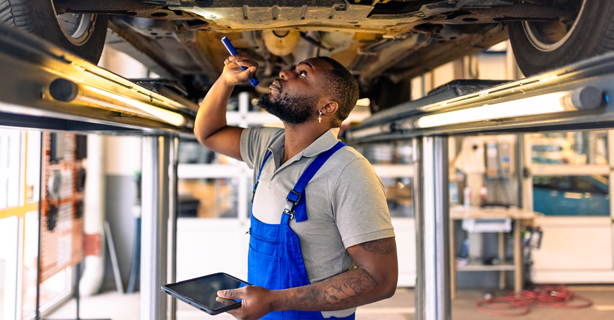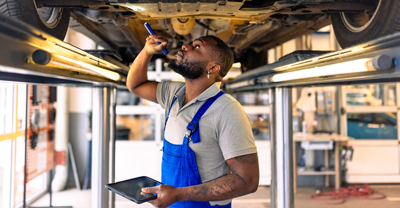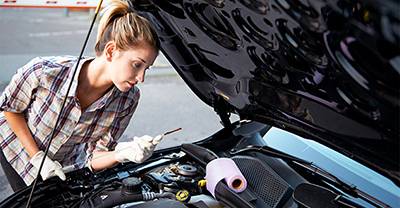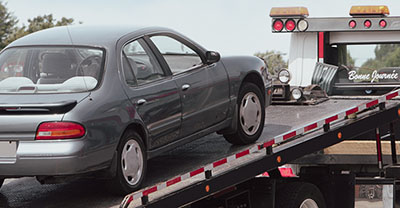Why regular vehicle maintenance matters


0 min. read
Are you skipping your car’s routine car maintenance needs to cut costs? While it might seem like a money-saving strategy in the short term, neglecting vehicle upkeep can lead to major financial setbacks and could compromise your safety down the road. Explore Dairyland’s cheap car insurance options to find the coverage that fits your lifestyle and budget.
Regular maintenance plays a crucial role in helping ensure your car's optimal performance, extending its lifespan, and ultimately saving you time, frustration, and money by potentially preventing unexpected repairs. Let's explore the significance of keeping a regular car maintenance schedule and why it’s so essential.
The benefits of consistent car maintenance
Maintaining a consistent car service schedule brings advantages for both you and your vehicle. Here are a few examples:
Enhanced safety
Consistent car service can help you identify potential safety hazards such as faulty brakes, worn tires, and other mechanical issues. Furthermore, addressing fluid leaks, inefficient engines, and emissions issues not only helps protect your car, but also reduces harm to the environment by averting the leakage of toxic substances and reducing carbon emissions.
Improved reliability
Proactively maintaining your car through regular check-ups helps reduce the risk of breakdowns, saving you from expensive emergency repairs and potential car rental costs. Additionally, it can help you avoid the stress and inconvenience of being stranded on the side of the road.
Maximized fuel efficiency
Did you know, on average, a regular tune-up can improve fuel economy by 4%? In today's volatile fuel market, these savings can really add up. Moreover, optimizing fuel efficiency not only cuts costs at the pump but can also reduce your carbon footprint by emitting fewer pollutants into the environment.
Higher resale value
Thinking of selling your car or trading it in someday? A car with a complete service history and regular maintenance can yield a higher resale value than one with a spotty record of upkeep.
Reduced ownership costs
Addressing issues promptly and keeping your car in good condition can help lower the risk of accumulating hefty service fees when you eventually bring your car in after months or years of neglect. Running on low fuel, driving with worn-out tires, or operating without proper coolant are all factors can all contribute to increased long-term expenses for your car.
Functional electrical systems
Regular maintenance helps ensure the consistent functionality of warning lights and indicators. While the Check Engine light may be bothersome, it's far better than not being alerted to a serious issue due to irregular functioning or frequent failures caused by a lack of maintenance.
Time savings
Ignoring maintenance can lead to bigger problems that can leave your car out of commission for days or even weeks—especially as supply chain issues continue to contribute to delays in getting parts. We’re all busy, so don’t let your valuable time be wasted waiting for repairs.
Confidence in your car
Knowing your car is in optimal condition can bring you peace of mind while driving. You can confidently navigate the road, free from concerns about potential breakdowns or malfunctioning systems.

Car maintenance frequency
Your car's service requirements depend on factors like make, model, age, and mileage. Generally, manufacturers advise scheduled maintenance every 12,000 miles or 12 months. Consult your vehicle's manual for its specific schedule—this can help you comply with manufacturer warranties.
Regular checks typically include:
Mechanic inspection: A thorough examination of the vehicle to identify any potential issues
Engine checkup: Evaluating the engine's health and performance
Oil change and filter replacement: Ensuring proper lubrication and engine protection
Tire rotation and balancing: Promoting even wear and tear for optimal traction and longevity
Fluid checks and top-offs: Maintaining proper levels of essential fluids like:
Brake fluid
Radiator coolant
Power steering fluid
Transmission fluid
Windshield wiper fluid
Brake inspection and service: Verifying proper braking function and addressing any wear or tear
Battery check and potential replacement: Ensuring reliable starting power
Suspension and steering check: Promoting smooth handling and control
Emissions test (where applicable): Meeting environmental regulations and contributing to clean air
The impact of neglecting maintenance
Consider this: The average U.S. driver spends approximately $1,186 per year on vehicle repairs and maintenance. Now, envision the potential cost of a single breakdown or unexpected issue, including expenses for towing, rental vehicles, missed work, auto shop labor, and parts. And these costs would hit suddenly, rather than being spread over the year.
And that's not all. Consider the possibility of an accident—with its associated claims costs and medical expenses—caused by parts failures such as worn brake pads, defective tires, or power steering issues.

The general information in this blog is for informational or entertainment purposes only. View our blog disclaimer.
*Data accuracy is subject to this article's publication date.










